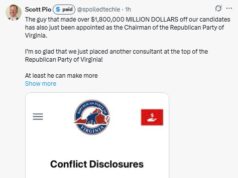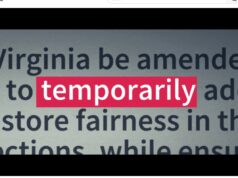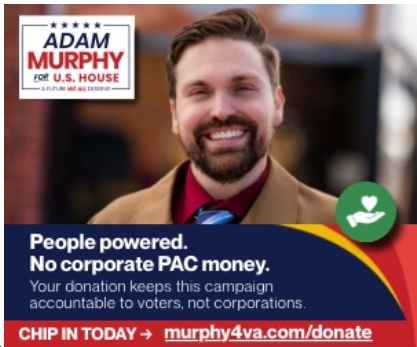Throughout last year, grassroots groups expressed frustration at how “the Party” handled the elections, their strategy, the tools they chose, how they interacted with the grassroots, and a host of other issues. After the election, many activists said that the great results were in spite of the party, not because of it.
This past Sunday, Chris Bolling, Executive Director of the Democratic Party of Virginia (DPVA) came to speak at the NoVA Grassroots Coalition meeting (a monthly meeting of leaders of various grassroots organizations), and one of the first things Bolling tried to do was to clarify that people expressing anger at “the Party” needed to understand who they were talking about, since that encompasses many distinct levels that operate mostly independently of one another. For example, he explained that if you thought “the Party” should have supported more candidates or tougher races, or divided the money among candidates in a different way, those were all decisions made by the House Democratic Caucus, not DPVA.
Bolling then went on to describe in greater detail the five layers that make up what we think of as “the Party”:
- The national party groups. This includes DGA (Democratic Governors Association), DCCC (Democratic Congressional Campaign Committee), DLCC (Democratic Legislative Campaign Committee), DAGA (Democratic Attorney Generals Association), who respectively work exclusively at the national level on campaigns for governors, Congressional races, legislative races, and Attorneys General. And the DNC (Democratic National Committee), which sets the party platform, and coordinates state and local parties. The DCCC is fairly well funded, but the other national groups are often underfunded or even in debt.
- The state top campaigns. In 2017, that was mainly the Northam for Governor campaign (plus the Fairfax for LG and Herring for AG campaigns). This year, it’s Sen. Tim Kaine’s reelection campaign. These campaigns raise their own money and operate autonomously, focusing on getting their candidates at the top of the ticket elected.
- The Coordinated campaign. This is a parallel-organization to the state top campaign, with leaders selected by the state top campaign and funding by the top campaign. The Coordinated’s job is to run the field campaigns up and down the ticket.
- The Democratic Party of Virginia (DPVA). DPVA is the “support” arm of the state party. They provide data and support services, run the VAN, and assist local committees. They do their own fundraising, and spend those funds on their own staff and functions, as well as contributing some to the other levels of the party.
- The House/Senate Caucuses. They work to elect and re-elect Delegates and Senators. They do their own fundraising, and operate autonomously.
What Bolling explained about each of these groups is that they can vary in terms of how conservative they are in campaign strategies, in willingness to work with grassroots organizers, willingness to use the latest technologies and social media, etc. For example, Tim Kaine’s campaign is expected to be quite progressive in that sense, far more so than Ralph Northam’s was, or Mark Warner’s will be.
Ultimately, although the levels communicate back and forth with one another, Bolling said, each one operates independently and autonomously. It’s a tenuous relationship. So, DPVA doesn’t tell the House Democratic Caucus how to run their Delegate campaigns, and the House or Senate Caucus doesn’t tell the gubernatorial campaign what to do.
They are also quite likely to have different strategies from one another, as in the case of a gubernatorial campaign and the House campaigns. The main thing each one considers is who their target voters are, and how to reach those target voters specifically. And even though Democratic candidates might be running in the same election cycle as one another, they might not have the same targets, and certainly the targets change from year to year.
For example, in 2017, Northam obviously needed to turn out voters in Northern Virginia and Richmond–where Democrats also expected to pick up Delegate seats–but because he had strong support in Hampton Roads, where Democrats don’t always pick up a lot of votes, his campaign shifted some resources towards working to reach voters in that area more. That didn’t necessarily mean, though, that the House Caucus wanted to shift their money or energy towards those House races.
Bolling was asked multiple ways about the role of the grassroots. In fact, a few people noted that he didn’t actually mention the grassroots until someone specifically brought it up. I think although he showed up, which is a first step for sure, he still hasn’t quite begun to think about where the grassroots activists fit into the picture. He said repeatedly that the party was caught off guard by the size of the blue wave, and hadn’t really strategized with such a large force in mind, but that he did not expect them to make that mistake again. Yet, if he isn’t thinking about ways to tap into and corral the energy of the grassroots activists, it doesn’t seem clear that they won’t be surprised again. And at the same time, if the grassroots activists don’t figure out how to communicate with and trust the party and its leaders somewhat, we risk missing out on the kinds of synergies we might develop.
You know the movie My Big Fat Greek Wedding? Sometimes I think Democrats are the Portokalos family–everyone talking on top of one another, kinda loud, kinda crazy, sometimes fighting, but all really passionate, warm and welcoming. And the Republicans are the quiet, Protestant, Miller family, sitting in near silence at a big half-empty candlelit table.











![Video: Sen. Mark Warner Says He’s “concerned that [the Trump administration] may try out some of their [voter suppression] tactics” in the VA Redistricting Referendum in April](https://bluevirginia.us/wp-content/uploads/2026/02/warner0212-100x75.jpg)
